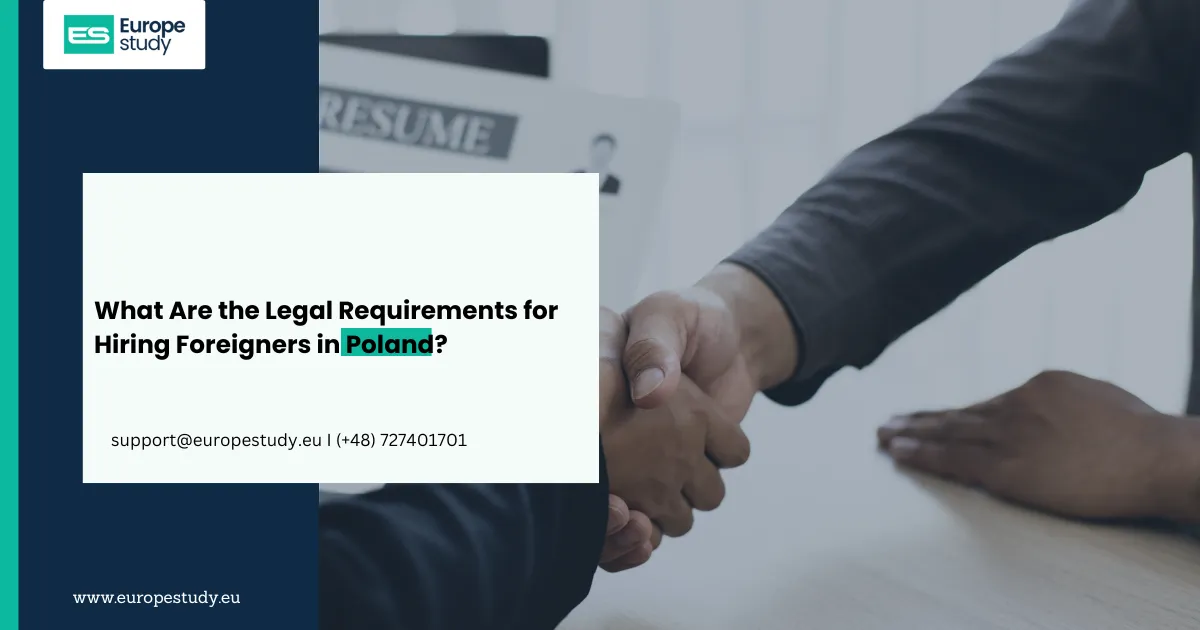
What Are the Legal Requirements for Hiring Foreigners in Poland?
Introduction
As Poland continues to grow economically and attract global talent, more companies are looking to hire foreigners to fill skills gaps or support international operations. However, hiring foreign nationals in Poland involves specific legal procedures, particularly for non-EU workers.
This guide provides a comprehensive overview of the legal requirements for hiring foreigners in Poland in 2025, including work permits, employer obligations, tax registration, and compliance issues.
Categories of Foreign Workers in Poland
Before initiating the hiring process, it is important to understand that foreign workers fall into two main legal categories in Poland:
- EU/EEA and Swiss citizens
- Non-EU/EEA citizens (third-country nationals)
Each group is subject to different legal frameworks.
1. Hiring EU/EEA/Swiss Citizens
EU/EEA citizens and Swiss nationals enjoy freedom of movement, which means:
- No work permit is required
- They can work under the same conditions as Polish nationals
- Must register their stay in Poland if staying longer than 90 days
- Employers must register the employee with the Social Insurance Institution (ZUS) and provide a written employment contract
Documents needed by the employer:
- Copy of passport/ID
- PESEL number (optional but useful)
- Residence registration document (after 90 days)
2. Hiring Non-EU Citizens (Third-Country Nationals)
Hiring non-EU citizens requires more legal steps. Employers must ensure that the foreigner has the legal right to work and reside in Poland.
Main requirements:
- Valid residence and work permit
- Employment contract or civil law agreement
- Labour Market Test (in most cases)
Types of Work Permits in Poland
Polish law recognizes several types of work permits depending on the situation and the type of employment:
Type A — Most Common
Issued when a foreigner is employed by a company registered in Poland. Required if the employee will work under a contract in Poland.
Type B
Issued to board members who stay in Poland for more than 6 months within a 12-month period.
Type C
For foreigners sent to Poland by a foreign employer for a period longer than 30 days.
Type D
For foreigners working for a non-Polish employer but performing services in Poland.
Type E
For other types of work not covered by types A–D.
Note: Each work permit is employer-specific and job-specific. If the employee changes jobs, a new permit must be issued.
The Labour Market Test
Before applying for a work permit, Polish employers often need to conduct a labour market test to prove that no suitable Polish or EU candidate is available.
However, the test is waived if:
- The position is on the shortage occupation list
- The foreigner is a graduate of a Polish university
- The foreigner has previously held legal employment in Poland for a specified period
Steps to Hire a Foreigner in Poland (Non-EU)
Step 1: Confirm Eligibility and Residence Status
Ensure the candidate has a legal basis to stay in Poland (visa, temporary residence, or pending application).
Step 2: Conduct Labour Market Test (if required)
Apply to the local District Labour Office (PUP) to confirm the position cannot be filled by a local candidate.
Step 3: Apply for the Work Permit
Submit an application to the Voivodeship Office (Urząd Wojewódzki). Required documents include:
- Completed application form
- Employment contract or offer
- Information about the employer
- Justification of hiring the foreigner
- Proof of the labour market test (if applicable)
- Company documents (KRS/REGON, tax certificate, etc.)
Step 4: Wait for Permit Issuance
Processing time can vary from 30 to 90 days. Once approved, the foreigner must collect their permit and, if needed, apply for a visa or residence card.
Step 5: Sign Employment Contract
Must be in writing, translated into a language the employee understands. Conditions should match those in the work permit.
Step 6: Register with ZUS and Tax Office
Employers must register the foreigner for:
- Social security (ZUS)
- Tax identification number (NIP) or PESEL
Alternatives: Declaration of Employment (Simplified Procedure)
For citizens of certain countries (Ukraine, Belarus, Moldova, Georgia, Armenia), employers may use a simplified employment declaration procedure for short-term work (up to 24 months as of 2025).
Requirements:
- No work permit needed
- Must register the declaration with the District Labour Office
- Only valid for certain job types and durations
Employer Obligations
When hiring a foreigner, Polish employers are legally responsible for:
- Ensuring the foreigner has valid documents to live and work in Poland
- Maintaining accurate employment records
- Providing fair working conditions
- Registering the employee with social insurance
- Reporting the start and end of employment to the Voivodeship Office and ZUS
- Keeping copies of residence and work permits on file
Non-compliance can lead to serious penalties, including fines, bans on hiring foreigners, and liability for illegal employment.
Taxation and Insurance for Foreign Employees
Foreign employees are generally subject to the same tax and social security obligations as Polish workers.
- Income tax (PIT): typically 12% or 32%, depending on income level
- Social security contributions: pension, disability, and health insurance paid by employer and employee
Tax residency may depend on length of stay and employment contract conditions.
Final Thoughts
Hiring foreigners in Poland is entirely legal and often necessary in today’s international labor market. However, the process involves several legal steps, especially when hiring non-EU nationals. Employers must ensure full compliance with Polish immigration and labor laws to avoid legal issues.
Understanding the different types of permits, exemptions, and procedures will help businesses hire international talent efficiently and legally. It’s highly recommended to consult with legal or immigration specialists if you're hiring foreign workers for the first time.





